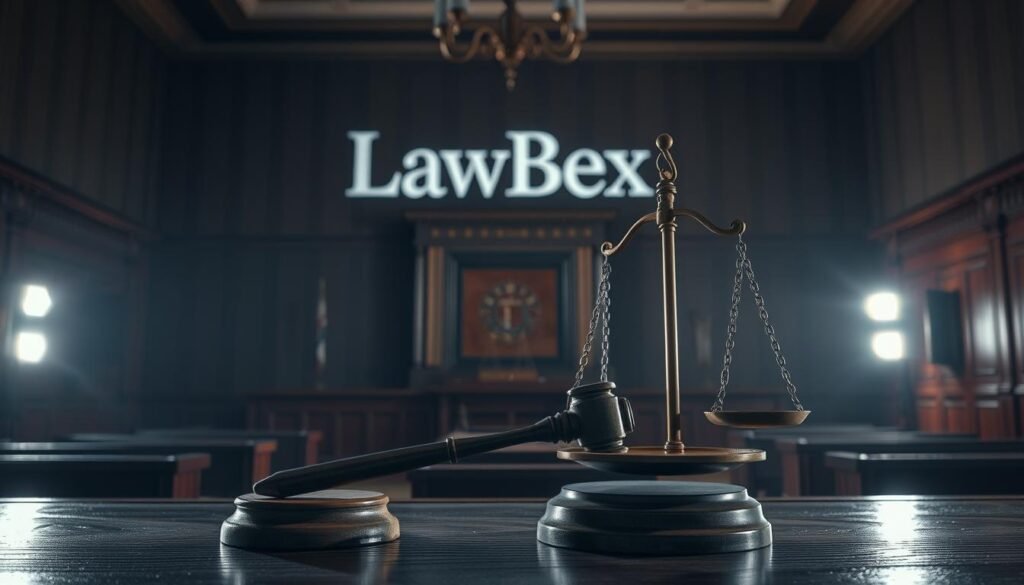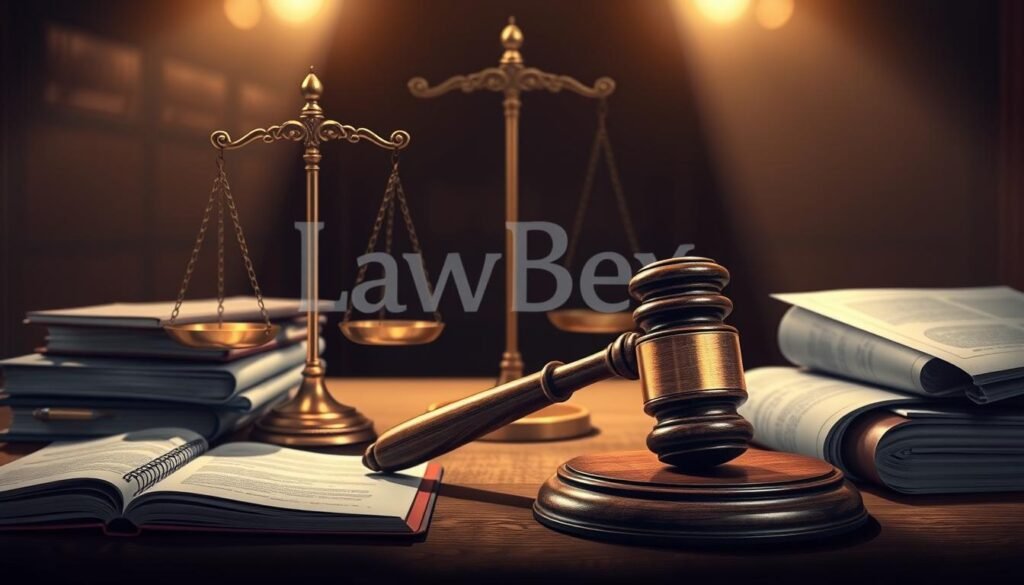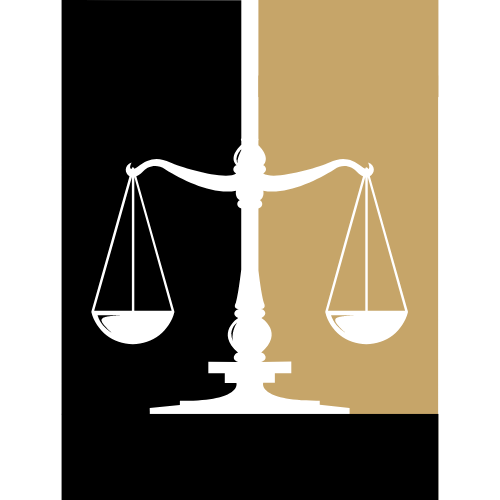Did you know over 73 million Americans, or nearly 1 in 3 adults, have a criminal record? Navigating the criminal justice system can be tough to understand. But with the right help, you can stand up for your rights and protect your interests. This guide offers expert advice and practical tips to help you navigate the system in the United States.
Key Takeaways
- Understand the key components and processes of the criminal justice system
- Learn about your fundamental rights and legal protections
- Navigate arrest procedures and assert your rights
- Navigate the bail system and court proceedings
- Secure effective legal representation and work with your legal team
- Understand sentencing guidelines and the appeals process
- Explore rehabilitation and reentry programs
Understanding the Criminal Justice System
Going through the criminal justice system can feel overwhelming. But knowing its parts and steps is key. We’ll look at the system’s stages, from start to finish. We’ll also cover your legal rights and how the U.S. Constitution protects you.
Key Components and Processes
The criminal justice system has law enforcement, courts, and corrections. Each part is vital for handling crimes. From the start of an investigation to the end of a sentence, knowing these steps is crucial.
Fundamental Rights and Protections
The U.S. Constitution and laws give strong due process and legal rights. These include the right to a fair trial and the chance to be presumed innocent. Knowing and using these rights is important for a fair outcome.
“The criminal justice system is designed to protect the rights of all individuals, both the accused and the victims of crime. Understanding your rights and how to navigate the system is essential for a fair and just outcome.”
Initial Encounters with Law Enforcement
Starting your journey through the criminal justice system often begins with a run-in with the police. As law-abiding citizens, knowing our rights and duties is key. Understanding the right steps helps protect our rights and keeps our interactions with the police positive.
When stopped by the police, staying calm and cooperative is the first step. Asserting your Miranda rights is crucial. These rights include the right to remain silent, the right to have an attorney, and the right to refuse to answer questions without an attorney.
- Clearly state: “I do not wish to answer any questions without my attorney present.”
- Avoid making any statements or admissions, even if you believe you have done nothing wrong.
- Politely but firmly refuse to consent to any searches of your person, vehicle, or belongings without a warrant.
It’s important to know that arrest procedures can change based on the situation and where you are. But the main advice is to stay calm, be respectful, and assert your rights. Cooperating with the police while protecting your legal rights is the best way to handle these initial meetings.
“The ultimate measure of a man is not where he stands in moments of comfort and convenience, but where he stands at times of challenge and controversy.” – Martin Luther King Jr.
By knowing the right steps for an encounter with law enforcement, we can protect our rights and have positive interactions with the police. Remember, knowledge is power. Understanding your Miranda rights and arrest procedures is key to navigating the criminal justice system.

Navigating the criminal justice system
Understanding the criminal justice process is key. The arrest stage is critical, where your rights and due process matter most. We’ll guide you through what happens during an arrest and how to protect your rights.
Navigating Arrest Procedures
Being arrested means knowing the standard steps. You’ll be told the charges, have your belongings taken, and go to a police station. Stay calm and cooperative, while remembering your legal rights.
Asserting Your Rights
It’s important to speak up for your legal rights during an arrest. This includes the right to silence, an attorney, and a speedy trial. Knowing and using these rights helps protect your due process and interests.
Navigating the criminal justice system is tough, but being informed helps. By being proactive, you can protect your rights and interests.
| Legal Right | Description |
|---|---|
| Right to Remain Silent | You have the right to refuse to answer questions or provide any statements without an attorney present. |
| Right to an Attorney | You have the right to have an attorney present during any questioning or legal proceedings. |
| Right to a Speedy Trial | You have the right to a prompt trial, without unreasonable delays, to ensure a fair and timely resolution of your case. |
Criminal Charges and the Bail System
After an arrest, you’ll face the complex process of criminal charges and bail. It’s key to understand the different charges, their consequences, and the bail process. This knowledge helps protect your rights and freedom. We’ll guide you through these important steps in the criminal justice system.
Understanding Criminal Charges
Criminal charges vary from misdemeanors to felonies. Misdemeanors are less serious, like petty theft or minor drug possession. Felonies are more serious, such as aggravated assault or grand larceny. The charges depend on the crime and where it happened.
Knowing the consequences of your charges is crucial. These can include fines, probation, or jail time. A good attorney is vital in navigating this and protecting your rights.
Navigating the Bail Process
- After being charged, the court decides if you can be released on bail or stay in custody until trial.
- Bail is money or security the court requires for release while your case is pending.
- The bail amount considers the charge severity, flight risk, and community ties.
- If bailed, you must follow court conditions, like attending court dates and not committing more crimes.
The bail process is complex. It’s wise to get help from a skilled criminal defense attorney. They can fight for your rights and ensure due process.

“The bail system is a critical component of the criminal justice system, as it allows individuals to exercise their constitutional right to be presumed innocent until proven guilty.”
Preparing for Court Proceedings
As you go through the criminal justice process, getting ready for court is key. Good preparation can really change your case’s outcome. Here are some important steps to take as you prepare for court:
- Collaborate Closely with Your Legal Team: Work closely with your lawyer to stay informed and on the same page. Talk about the timeline, what to expect, and your role in the process.
- Gather Relevant Evidence: Collect any important documents, witness statements, or other evidence that supports your case. Your lawyer will tell you what you need.
- Understand Courtroom Procedures: Learn about the courtroom layout, the roles of everyone there, and what’s expected of you. Knowing this will help you feel more at ease when you’re in court.
- Prepare Your Testimony: If you’ll be testifying, work with your lawyer to make a clear and honest story. Practice answering questions to stay calm and focused.
- Anticipate Potential Challenges: Talk with your lawyer about possible problems or opposing views. Plan how to handle them during court.
By putting in the work to prepare well for court, you can improve your chances of a good outcome. Remember, your legal representation and your active role in the criminal justice process are crucial for the best results.
“Preparation is the key to success in any endeavor, and court proceedings are no exception. The more you prepare, the better equipped you’ll be to navigate the complexities of the criminal justice system.”
The Importance of Legal Representation
Going through the criminal justice system can feel overwhelming. It’s especially tough if you don’t know the process well. Having a good legal representation is key to protecting your rights and getting a good result. A skilled criminal defense attorney can make a big difference in your case.
Selecting the Right Attorney
Finding the right criminal defense attorney is a big decision. It can greatly affect your case’s outcome. Here are some things to consider when choosing an attorney:
- Experience: Look for an attorney with a track record of winning cases like yours.
- Specialization: Make sure the attorney focuses on criminal defense and knows the laws well.
- Communication: Pick an attorney who talks to you clearly, keeps you updated, and is easy to reach.
- Reputation: Check the attorney’s reputation and ask for recommendations from people you trust.
Working with Your Legal Team
Having a good attorney-client relationship is crucial. Work closely with your team, give them all the information they need, and follow their advice. Being open and honest helps your attorney build a strong defense for you.
| Key Benefits of Hiring a Criminal Defense Attorney | Potential Consequences of Self-Representation |
|---|---|
|
|

Getting legal representation is a smart move in the criminal justice system. By picking the right criminal defense attorney and working with your team, you can improve your chances of a good outcome. This way, you can also protect your rights during the process.
Navigating the Trial Process
The criminal justice system can seem overwhelming. But knowing the trial process and courtroom rules can make your court appearance smoother. As we explore the trial process, it’s key to understand what’s expected in the courtroom.
Courtroom Etiquette and Conduct
Following proper courtroom etiquette is crucial for a successful trial. Here are some important guidelines:
- Dress professionally and conservatively to show respect for the court.
- Address the judge as “Your Honor” and speak clearly and respectfully.
- Refrain from interrupting the judge, attorneys, or witnesses during proceedings.
- Keep your body language and gestures composed and controlled.
- Avoid bringing food, drinks, or personal items into the courtroom.
- Turn off all electronic devices or keep them on silent mode.
By following these rules, you show your commitment to the criminal justice proceedings. This can help your case go well.
“Professionalism and respect in the courtroom can go a long way in navigating the trial process.”
Navigating the trial process is complex. But with help from legal experts and knowing the courtroom etiquette, you can feel confident. Your behavior in court can greatly affect how your case is seen and its outcome.
Understanding Sentencing Guidelines
When someone is found guilty, the sentencing phase is key. This is when the judge decides the punishment. It’s based on the sentencing guidelines. Knowing these guidelines is vital for defendants and their lawyers.
In the U.S., sentencing guidelines help judges decide on sentences. They look at the crime’s severity, the defendant’s past crimes, and other factors. This way, judges try to make sure sentences are fair and consistent.
Different places have different sentencing guidelines. But they usually fall into two types. Mandatory minimum sentences set a minimum jail time for some crimes. Advisory sentencing ranges give judges a suggested range to choose from.
| Sentencing Guideline Type | Description | Impact on Legal Outcomes |
|---|---|---|
| Mandatory Minimum Sentences | Predetermined minimum terms of incarceration for specific offenses | Limits judge’s discretion, ensures consistency but can lead to harsher sentences |
| Advisory Sentencing Ranges | Recommended sentencing frameworks based on offense severity and defendant’s criminal history | Allows judges more flexibility in determining appropriate punishment while maintaining guidelines |
It’s important for defendants and their lawyers to understand sentencing guidelines. Knowing these guidelines helps them prepare for the legal process. It also helps them make smart choices about their defense.

“The sentencing guidelines are designed to promote fairness and consistency in the criminal justice system, but their application can have significant implications for the defendant.”
Appeals and Post-Conviction Relief
Understanding appeals and post-conviction relief is key in the criminal justice system. Appeals let you challenge a case’s outcome. Post-conviction remedies give a second chance to fix errors or injustices from the trial or appeal.
Grounds for Appeal
The appeals process is a chance to question a conviction or sentence. You can appeal if there were legal mistakes, not enough evidence, or a denied constitutional right. Lawyers review the case to find appeal grounds and start legal actions.
Seeking Post-Conviction Relief
After appeals, you might seek post-conviction relief. This can be to challenge a conviction, get DNA exoneration, or fix a wrong sentence. These remedies aim to fix specific injustices and involve detailed legal steps.
Understanding the appeals and post-conviction relief process is crucial. With the right lawyers, you can overturn wrong convictions, lessen harsh sentences, or fix other trial or appeal issues.
| Appeals Process | Post-Conviction Relief |
|---|---|
| Challenges the validity of a conviction or sentence | Addresses issues not addressed during the initial trial or appeal |
| Focuses on legal errors, insufficient evidence, or denial of constitutional rights | Includes challenging the legality of a conviction, seeking DNA exoneration, or addressing sentencing errors |
| Initiated through the court system | Involves complex legal proceedings tailored to specific issues |
“The appeals process and post-conviction relief are essential safeguards in the criminal justice system, providing individuals with the opportunity to challenge unjust outcomes and seek a second chance at justice.”
Rehabilitation and Reentry Programs
For those who have been through the criminal justice system, rehabilitation and reentry programs are key. They help in rebuilding lives and reintegrating into society. These programs offer a second chance to those seeking it.
Rehabilitation programs include education, vocational training, mental health, and addiction treatment. They aim to give offenders the skills to avoid going back to jail. This helps them transition smoothly back into their communities.
Reentry programs focus on the post-release phase. They provide support and guidance to help individuals adjust to life after jail. This includes housing, job placement, and social services to aid in a smooth reintegration.
The role of these programs is crucial. They address the causes of criminal behavior and offer a path to a better future. This helps reduce recidivism rates and improves public safety. They also restore dignity and empower individuals, benefiting the criminal justice system and communities.

Exploring the criminal justice system shows the importance of rehabilitation and reentry programs. Investing in these initiatives supports personal transformation. It also improves society as a whole.
Preserving Your Rights and Dignity
As you go through the criminal justice system, it’s key to watch over your legal rights and keep your dignity. We’ll guide you on how to stand up for your rights, face challenges, and handle the emotional side of the criminal justice system.
Understanding your due process rights is a big step. This means you have the right to a fair trial, to be presumed innocent, and to have an attorney. By using these rights, you make sure your voice is heard and your interests are looked after.
- Learn about your constitutional rights, like the right to stay silent and a speedy trial.
- Work with law enforcement, but remember you can refuse to answer questions without a lawyer.
- Talk openly and kindly with your legal team, so they can build a strong defense for you.
Keeping your dignity up can be tough, but it’s vital for your well-being and case outcome. Get support from people you trust, like friends, family, or mental health experts, to deal with the criminal justice system‘s emotional and psychological effects.
“The true measure of any society can be found in how it treats its most vulnerable members.” – Mahatma Gandhi
Remember, you deserve respect and fairness, no matter what. By standing up for your rights and keeping your dignity, you can face the criminal justice system with courage and strength.
Resources and Support Services
Going through the criminal justice system can feel overwhelming. But, you don’t have to face it by yourself. At [https://www.apna.org/criminal-justice-system-resources/], we’ve gathered a wide range of resources and support services. These include legal aid, victim support, and help from community-based organizations.
Legal aid is crucial for those facing criminal charges or looking for legal help. Many non-profits and public defender’s offices offer free or low-cost legal services. They help you understand your rights, guide you through the legal system, and protect your interests.
For those affected by crime, victim support services are available. These groups offer emotional support, counseling, and help with the criminal justice system. They can also assist with medical care, housing, and other basic needs.
| Resource | Description | Contact Information |
|---|---|---|
| National Legal Aid & Defender Association | Provides information and referrals for legal aid services across the United States. | www.nlada.org |
| National Crime Victim Law Institute | Offers legal services and support for victims of crime. | www.ncvli.org |
| Nonprofit Legal Services | Provides free or low-cost legal representation for individuals with limited financial resources. | www.lsc.gov |
There are also community-based organizations that offer support and help. They provide counseling, job training, and other services. These help individuals reintegrate into their communities after being incarcerated.
Remember, you don’t have to go through the criminal justice system alone. By using the available resources and support services, you can protect your rights. And you’ll have the help you need to navigate this tough process.
“The criminal justice system is complex, but with the right support and resources, you can overcome the challenges and secure a positive outcome.”
LEGAL RIGHTS IN CRIMINAL CASES: WHAT YOU NEED TO KNOW
Conclusion
This guide has given you a deep understanding of the criminal justice system. It has shown you how to navigate it with confidence. We’ve covered the basics, key steps, and your rights and protections.
Whether you’re first meeting with law enforcement or dealing with the trial process, this guide helps. It gives you the legal guidance and expert advice you need. Remember, you have rights, and with the right knowledge, you can get the best outcome for your case.
As you move through the criminal justice system, keep coming back to this guide. Use the resources and support services it offers. By staying informed and proactive, you can protect your rights and make sure your voice is heard. Together, we can move through the system with clarity, resilience, and a commitment to justice.
